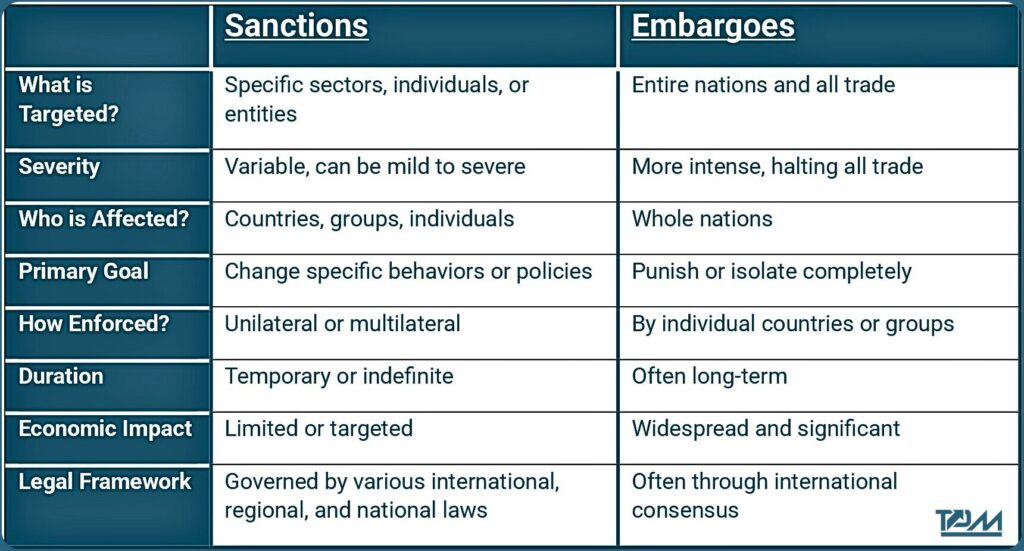Embargoes, quotas, and standards are tools that countries use to protect their domestic markets from foreign competition. These measures can be effective in promoting economic growth and development, but they can also have negative consequences for consumers and producers alike. In this article, we will explore the role of embargoes, quotas, and standards in international trade.
What Are Embargoes?
An embargo is a government-imposed restriction on trade with a particular country or group of countries. This can take many forms, such as a ban on imports or exports, restrictions on financial transactions, or a prohibition on travel. Embargoes are often used as a political tool to exert pressure on other countries to change their behavior or policies.
One example of an embargo is the United States’ long-standing trade embargo against Cuba. This embargo was first imposed in 1960 and has been in place ever since. The aim of the embargo was to isolate Cuba economically and politically in order to bring about political change. However, critics argue that the embargo has had little effect on the Cuban government and has instead hurt ordinary Cubans by restricting access to goods and services.
What Are Quotas?
A quota is a limit on the amount of a particular product that can be imported into a country during a specified time period. Quotas are often used to protect domestic industries from foreign competition by limiting the supply of imported goods. This can help to support local businesses and promote economic growth.
However, quotas can also have negative consequences. By limiting the supply of imported goods, quotas can lead to higher prices for consumers and reduced choice. They can also create inefficiencies in the market by creating artificial scarcity and encouraging rent-seeking behavior among producers.
What Are Standards?
Standards are technical requirements that products must meet in order to be sold in a particular market. These requirements can relate to product safety, quality, environmental impact, or other factors. Standards are often used to protect consumers from unsafe or low-quality products and to promote fair competition among producers.
However, standards can also be used as a barrier to trade. When standards are set in a way that is discriminatory or overly restrictive, they can make it difficult for foreign producers to enter a market. This can limit competition and lead to higher prices for consumers.
The Pros and Cons of Embargoes, Quotas, and Standards
Embargoes, quotas, and standards can all be effective tools for protecting domestic industries and promoting economic growth. However, they can also have negative consequences for consumers and producers alike.
On the one hand, embargoes can be an effective way to pressure other countries to change their behavior or policies. They can also help to protect national security by limiting the supply of certain goods or technologies.
On the other hand, embargoes can hurt ordinary people by restricting access to goods and services. They can also create inefficiencies in the market by encouraging rent-seeking behavior among producers.
Similarly, quotas can help to support local businesses and promote economic growth. By limiting the supply of imported goods, quotas can protect domestic industries from foreign competition.
However, quotas can also lead to higher prices for consumers and reduced choice. They can create inefficiencies in the market by creating artificial scarcity and encouraging rent-seeking behavior among producers.
Standards can be an effective way to protect consumers from unsafe or low-quality products. They can also promote fair competition among producers by ensuring a level playing field.
However, standards can also be used as a barrier to trade. When they are set in a way that is overly restrictive or discriminatory, they can make it difficult for foreign producers to enter a market. This can limit competition and lead to higher prices for consumers.
Conclusion
Embargoes, quotas, and standards are all tools that countries use to protect their domestic markets from foreign competition. While they can be effective in promoting economic growth and development, they can also have negative consequences for consumers and producers alike.
In order to ensure that these measures are used effectively and responsibly, it is important to carefully consider their pros and cons. By doing so, we can promote fair competition and support economic growth while also protecting consumers from harm.
References:
Embargoed Countries – U.S. Department of the Treasury
https://home.treasury.gov/policy-issues/financial-sanctions/sanctions-programs-and-country-information/embargoed-countries
Import Quotas – International Trade Administration
https://www.trade.gov/import-quotas
Product Standards – International Trade Administration
https://www.trade.gov/product-standards




